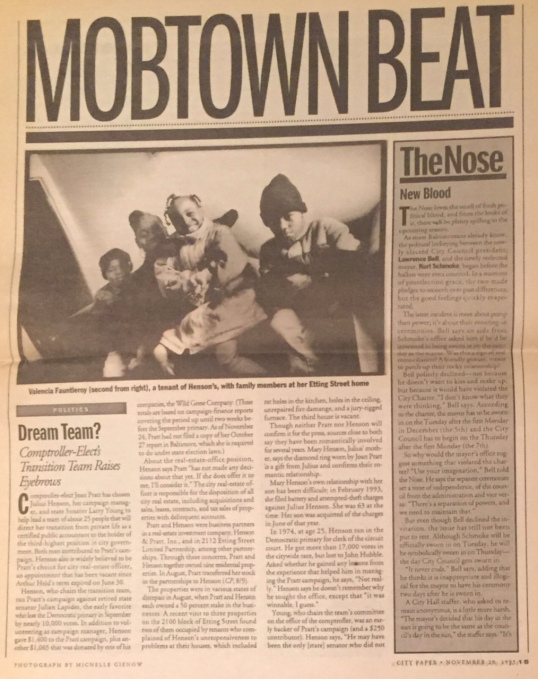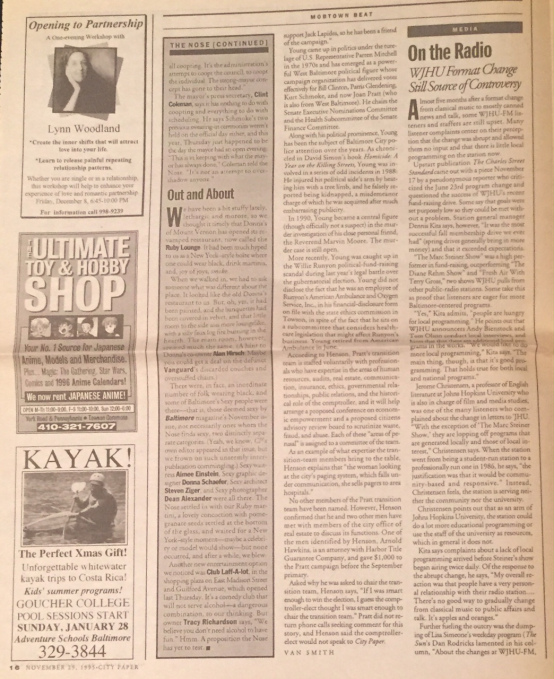By Van Smith
Published in City Paper, Nov. 29, 1995


Comptroller-elect Joan Pratt has chosen Julius Henson, her campaign manager, and state Senator Larry Young to help lead a team of about 25 people that will direct her transition from private life as a certified public accountant to the holder of the third-highest position in city government. Both men contributed to Pratt’s campaign. Henson is also widely believed to be Pratt’s choice for city real-estate officer, an appointment that has been vacant since Arthur Held’s term expired on June 30.
Henson, who chairs the transition team, ran Pratt’s campaign against retired state Senator Julian Lapides, the early favorite who lost the Democratic primary in September by nearly 10,000 votes. In addition to volunteering as campaign manager, Henson gave $1,400 to the Pratt campaign, plus another $1,065 that was donated by one of his companies, the Wild Geese Company. (These totals are based on campaign-finance reports covering the period up until two weeks before the September primary. As of November 24, Pratt had not filed a copy of her October 27 report in Baltimore, as she is required to do under state election laws.)
About the real-estate-office position, Henson says Pratt “has not made any decisions about that yet. If she does offer it to me, I’ll consider it.” The city real-estate officer is responsible for the disposition of all city real estate, including acquisitions and sales, leases, contracts, and tax sales of properties with delinquent accounts.
Pratt and Henson were business partners in a real-estate investment company, Henson & Pratt, Inc., and in 2112 Etting Street Limited Partnership, among other partnerships. Through these concerns, Pratt and Henson together owned nine residential properties. In August, Pratt transferred her stock in the partnership to Henson.
The properties were in various states of disrepair in August, when Pratt and Henson each owned a 50 percent stake in the businesses. A recent visit to three properties on the 2100 block of Etting Street found two of them occupied by tenants whjo complained of Henson’s unresponsiveness to problems at their houses, which included rat holes in the kitchen, holes in the ceiling, unrepaired fire damage, and a jury-rigged furnace. The third house is vacant.
Though neither Pratt nor Henson will confirm it for the press, sources close to both say they have been romantically involved for several years. Mary Henson, Julius’ mother, says the diamond ring worn by Joan Pratt is a gift from Henson and confirmed their romantic relationship.
Mary Henson’s own relationship with her son has been difficult; in February 1993, she filed battery and attempted-theft charges against Julius Henson. She was 63 at the time. Her son was acquitted of the charges in June of that year.
In 1974, at age 25, Henson ran in the Democratic primary for clerk of the circuit court. He got more than 17,000 votes in the citywide race, but lost to John Hubble. Asked whether he gained any lessons from the experience that helped him in managing the Pratt campaign, he says, “Not really.” Henson says he doesn’t remember why he sought the office, except that “it was winnable, I guess.”
Young, who chairs the team’s committee on the office of the comptroller, was an early backer of Pratt’s campaign (and a $250 contributor). Henson says, “He may have been the only [state] senator who did not support Jack Lapides, so he has been a friend of the campaign.”
Young came up in politics under the tutelage of U.S. Representative Parren Mitchell in the 1970s and has emerged as a powerful West Baltimore political figure whose campaign organization has delivered votes effectively for Bill Clinton, Parris Glendening, Kurt Schmoke, and now Joan Pratt (who is also from West Baltimore). He chairs the Senate Executive Nominations Committee and the Health Subcommittee of the Senate Finance Committee.
Along with his political prominence, Young has been the subject of Baltimore City police attention over the years. As chronicled in David Simon’s book Homicide: A Year on the Killing Streets, Young was involved in a series of odd incidents in 1988: He injured his political aide’s arm by beating him with a tree limb, and he falsely reported being kidnapped, a misdemeanor charge of which he was acquitted after much embarrassing publicity.
In 1990, Young became a central figure (though officially not a suspect) in the murder investigation of his close personal friend, the Reverend Marvin Moore. The murder case is still open.
More recently, Young was caught up in the Willie Runyon political-fund-raising scandal during last year’s legal battle over the gubernatorial election. Young did not disclose the fact that he was an employee of Runyon’s American Ambulance and Oxygen Service, Inc., in his financial-disclosure form on file with the state ethics commission in Towson, in spite of the fact that he sits on a subcommittee that considers healthcare legislation that might affect Runyon’s business. Young retired from American Ambulance in June.
According to Henson, Pratt’s transition team is staffed voluntarily with professionals who have expertise in the areas of human resources, audits, real estate, communication, insurance, ethics, governmental relationships, public relations, and the historical role of the comptroller, and it will help arrange a proposed conference on economic empowerment and a proposed citizens advisory review board to scrutinize waste, fraud, and abuse. Each of these “areas of perusal” is assigned to a committee of the team.
As an example of what expertise the transition-team members bring to the table, Henson explains that “the woman looking at the city’s paging system, which falls under communication, she sells pagers to area hospitals.”
No other members of Pratt’s transition team have been named. However, Henson confirmed that he and two other men have met with members of the city office of real estate to discuss its functions. One of the men identified by Henson, Arnold Hawkins, is an attorney with Harbor Title Guarantee Company, and gave $1,000 to the Pratt campaign before the September primary.
Asked why he was asked to chair the transition team, Henson says, “If I was smart enough to win the election, I guess the comptroller-elect thought I was smart enough to chair the transition team.” Pratt did not return phone calls seeking comment for this story, and Henson said the comptroller-elect would not speak to City Paper.
Share this:- Share






